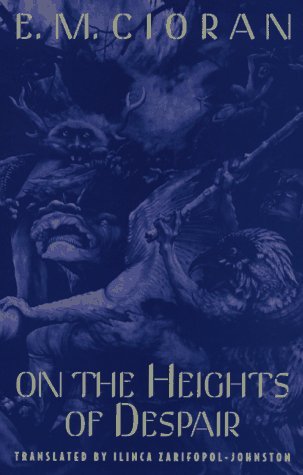Book Insider: On the heights of despair by Emil Cioran

 In Romania in the 1960s and 1970s, Cioran was a mysterious, almost mythological, presence. One would hear that such a person existed, but it was impossible to read him. His French books were neither sold nor published in translation, and his Romanian books had disappeared without a trace. Although he had departed his homeland some ten years before the war and the communist takeover, he was as invisible as the most unspeakable, or un-nameable, of non-persons. The present book is the first translation of Cioran from his native language into English, mastered by Ilinca Zarifopol Johnston, a graduate of the University of Bucharest in 1975, majoring in English and German. Her senior thesis "Speech Acts of Permission in English" was awarded the first prize of the Romanian National Student Scientific Colloquium for 1976. After official interventions on her behalf by nearly a dozen U.S. Congressmen and Senators, she was allowed to emigrate to the United States in 1977.
In Romania in the 1960s and 1970s, Cioran was a mysterious, almost mythological, presence. One would hear that such a person existed, but it was impossible to read him. His French books were neither sold nor published in translation, and his Romanian books had disappeared without a trace. Although he had departed his homeland some ten years before the war and the communist takeover, he was as invisible as the most unspeakable, or un-nameable, of non-persons. The present book is the first translation of Cioran from his native language into English, mastered by Ilinca Zarifopol Johnston, a graduate of the University of Bucharest in 1975, majoring in English and German. Her senior thesis "Speech Acts of Permission in English" was awarded the first prize of the Romanian National Student Scientific Colloquium for 1976. After official interventions on her behalf by nearly a dozen U.S. Congressmen and Senators, she was allowed to emigrate to the United States in 1977.
Cioran’s first book “On the Heights of Despair”, brings together all the themes from his later work: death, loneliness, disease, suffering, the abyss, nothingness, anguish, agony, madness, the absurd. He puts them all together as if afraid his time will run out and he will not have said all that burdened his soul. Or rather he spits them all out to free his spirit of them. While reading through his writings, you see a tormented man, tormented by the intensity and multitude or his feelings and ideas, you see him getting out of bed at four o’clock in the morning to pour them on paper, to rid himself of them, just like doctors used to “draw blood” from the ill persons, to ease their pain. It is his first book, written at an early age, when he hadn’t yet cultivated the abstruseness of his later works.
Although pessimism perspires throughout the book, still you can find traces of optimism, which was said to define his life, rather the pessimism in his works, as in the essay “Enthusiasm as a form of love”: “the joy of achieving and the ecstasy of efficiency are the essential characteristics of the man for whom life is a leap toward heights where destructive forces lose their negative intensity.”
For Cioran, writing is a form of treatment, a way to find at least a little relief from obsessions and agonies. But not a cure, though, for he chose to withdraw from public life (in Paris), and shared his loneliness with Simone Boue, to whom he left the hundreds of pages filled with his anxieties.
The translation aims at capturing the lyrical, whimsical spirit of Cioran's original Romanian, not a literal, word-for-word accuracy. Principally, this has meant a trimming of Cioran's youthful prose, mainly those passages that sound florid or redundant in English. All such cuts, changes, and revisions were either made by or approved by the author, who has also cut additional passages and sections that were conceptually repetitive.











